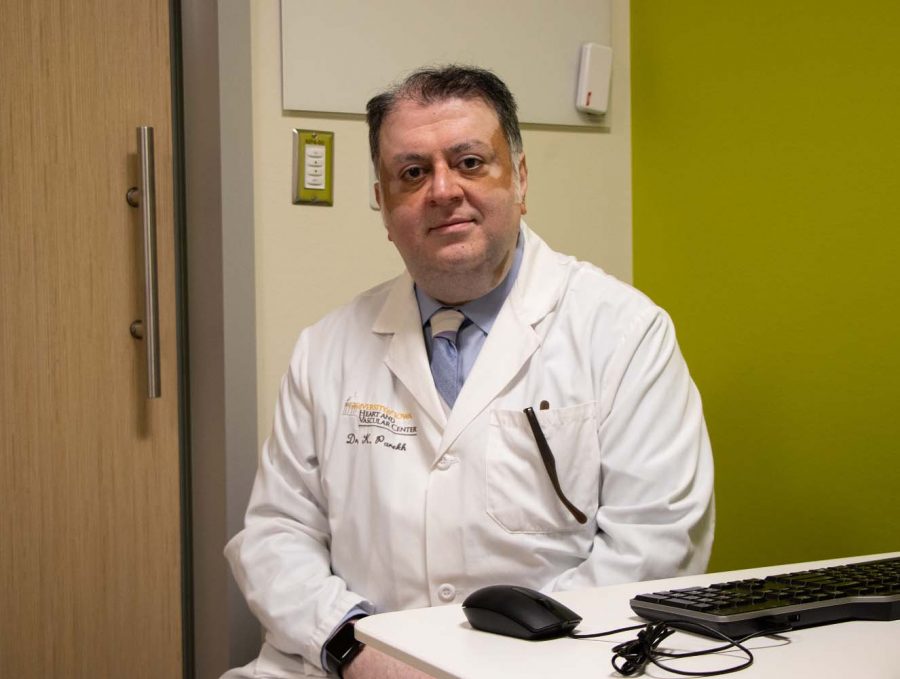UIHC appoints Kalpaj Parekh as the new Director of Department of Cardiothoracic Surgery
UIHC appoints Kalpaj Parekh as the new Director of Department of Cardiothoracic Surgery
Kalpaj Parekh, interim chair of the Department of Cardiothoracic Surgery poses for a portrait at the UI Heart and Vascular Center on Wednesday, Sept. 1, 2021.
November 13, 2022
After a national search by the University of Iowa Hospitals and Clinics, the chair and executive officer of the newly-reestablished department of cardiothoracic surgery has big plans to improve care.
Kalpaj Parekh started the position Nov. 1 after being named interim chair last September, and he said cardiothoracic surgery hasn’t reached its optimal potential at UIHC. The recently reestablished department was previously part of the surgery department because of a loss of personnel.
“I want to create a network of cardiothoracic surgery in the state of Iowa where we can share ideas and processes to improve outcomes across all the centers within the state,” Parekh said. “We have a lot more to offer to our patients, to the research community, and for education. We haven’t done that as well. It should be done, and it’s my goal to improve that.”
Parekh has been a cardiothoracic surgeon for 18 years. At UIHC, he held the position of division director from 2016 to 2021 and served as an interim chair of the department of cardiothoracic surgery since September 2021.
In his research, Parekh examines lungs that have been transplanted after a certain amount of time. He is part of the 1.3 percent of cardiothoracic surgeons in the U.S. whose research is funded by the National Institutes of Health, which he thinks made him stand out in the search.
“My lab is focused on understanding what causes these transplanted lungs to fail,” Parekh said. “We are looking at if we can prevent that from happening, and we are looking at the role of stem cells.”
RELATED: UI pauses search for vice president for medical affairs and Carver College of Medicine dean
Parekh said his cardiothoracic surgery department is also heavily invested in clinical trials that involve cardiac valves, cardiac assist devices, and cancer care for lung and esophageal cancers.
As a department chair, Parekh is invested in delivering the best possible patient care, supporting research, and providing high quality education.
He also administers diversity and equity in trainees throughout the faculty pool and ensures that patients from all backgrounds get the best possible care.
“Cardiothoracic surgery has been, over the years, a predominantly white male dominated specialty,” Parekh said. “Our focus is to make sure that it doesn’t remain that way.”
Matthew Howard, UIHC department chair of neurosurgery and leader of the search committee that selected Parekh, said the selection process was highly competitive.
“There was tremendous interest in this position,” Howard said. “It’s one of the oldest cardiothoracic academic units in the United States, and it is very prestigious.”
The state Board of Regents approved the university’s request to establish a freestanding department of cardiothoracic surgery in summer 2021. The new department was created after clinical needs for cardiothoracic surgery increased, according to the request.
Howard said the search for a department chair took around 10 months and was conducted by a large committee with representatives from every aspect of the institution that’s influenced by cardiothoracic surgery.
Some qualities they look for in the chairs of surgical departments, Howard said, are outstanding surgeons, accomplished researchers, and exceptional leadership ability.
“The dean meets with us and talks about his vision, and then we work with a search firm to find the best candidates in the United States,” Howard said. “We look at all their qualifications and then get it down to less than 10 for first pass Zoom interviews.”
After the initial interviews, the committee reached out to the best candidates for on-site visits, Howard said.
Howard said Parekh’s performance metrics stood out clearly from other candidates, and he was well-liked by his students and colleagues.
“As an interim chair, we know how the faculty in his department feel about him, and they were very, very positive about him as a leader,” Howard said. “So, that was critically important in the decision making process.”



